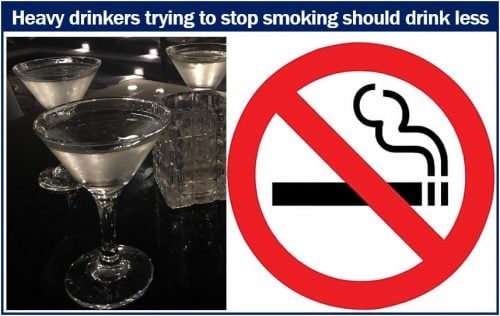If your New Year’s resolution is to stop smoking, and you are a heavy drinker, drink less booze. Heavy drinkers who are trying to stop smoking have more success if they cut back on their drinking. This is what a team of researchers from the US and Canada found.
They wrote about their study in the journal Nicotine & Tobacco Research (citation below). The authors were Sarah S Dermody, Christian S Hendershot, Allyson K Andrade, Maria Novalen, and Rachel F Tyndale.
The nicotine metabolite ratio of heavy drinkers declines if they drink less, the study showed. The nicotine metabolite ratio tells us how rapidly a person’s body metabolizes nicotine.
Harder for some people to stop smoking
Previous studies have suggested that individuals with high nicotine metabolism ratios tend to smoke more. They also find it harder to stop smoking.
Reducing people’s nicotine metabolism rate by drinking less might provide an edge when trying to stop smoking.

Lead author, Sarah Dermody, an Assistant Professor at Oregon State University, said:
“It takes a lot of determination to quit smoking, often several attempts. This research suggests that drinking is changing the nicotine metabolism as indexed by the nicotine metabolite ratio, and that daily smoking and heavy drinking may best be treated together.”
Nearly one in five adults both smoke and consume alcoholic drinks. Smoking is especially prevalent among heavy drinkers.
Drinking a risk factor for smoking
Consuming alcoholic beverages is a well-established risk factor for smoking. Also, smoking is a well-established risk factor for drinking.
Prof. Dermody and researchers at the Centre for Addiction and Mental Health in Toronto wanted to gain a better understanding of the links between smoking and drinking.
They studied the nicotine metabolite ratios of 22 regular daily smokers. All the smokers wanted treatment for alcohol use disorder. Alcohol use disorder is a medical term for problem drinking.
Prof. Dermody said:
“What’s really interesting is that the nicotine metabolite ratio is clinically useful. People with a higher ratio have a harder time quitting smoking cold turkey. They have are also less likely to successfully quit using nicotine replacement therapy products.”
When the men in the group reduced their drinking from (average) 29 to 7 drinks per week, their metabolite rates also declined.
Their findings for men replicated those of a previous study. This study, Prof. Dermody said, provides further evidence of nicotine metabolite ratio biomarkers’ value for people who are trying to stop smoking.
Nicotine metabolite ratio not such a stable index
Prof. Dermody explained:
“The nicotine metabolite ratio was thought to be a stable index, but it may not be as stable as we thought. From a clinical standpoint, that’s a positive thing, because if someone wants to stop smoking, we may want to encourage them to reduce their drinking to encourage their smoking cessation plan.”
The nicotine metabolite ratios of the women in the group did not decline. However, the authors also found that these women had not reduced their alcohol intake significantly during the study.
Regarding the study’s female participants, Prof. Dermody said:
“The rate of drinking for women in the study started low and stayed low. I anticipate that in a larger generalized study we would not see the difference between men and women like that.”
Prof. Dermody is planning a new study in which heavy drinkers take part in an intervention to reduce their alcohol intake. She also wants to try to replicate the findings from this study in a larger group.
Regarding addressing drinking and smoking together, Prof. Dermody said:
“This research is demonstrating the value in addressing both smoking and drinking together. The question now is how best to do that.”
Citation
“Changes in Nicotine Metabolite Ratio among Daily Smokers receiving Treatment for Alcohol Use Disorder,” Sarah S Dermody, Christian S Hendershot, Allyson K Andrade, Maria Novalen, and Rachel F Tyndale. Nicotine & Tobacco Research, nty265. DOI: https://doi.org/10.1093/ntr/nty265.

